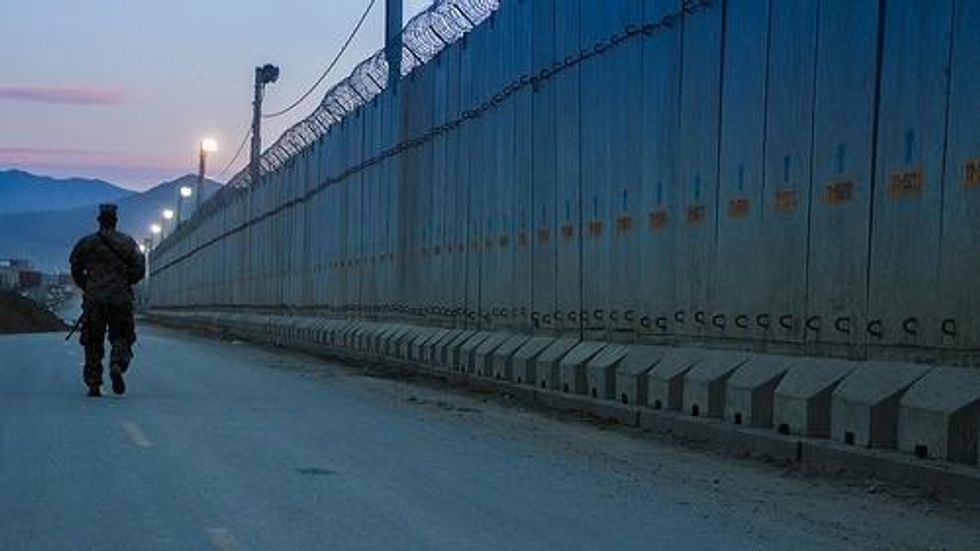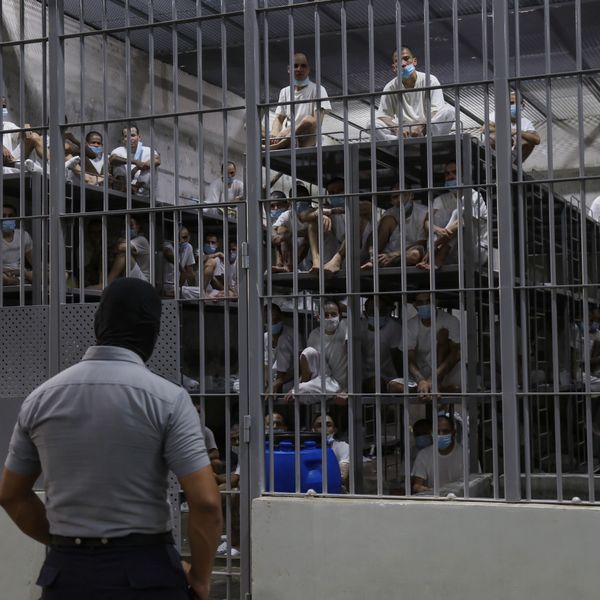Bagram: Torture, Detention Without End at US Military's 'Other Guantanamo'
Prisoners languishing in US-run Afghan prison will have no hope as officials admit there is no plan to shut it down

"Is there a plan [to close the prison]? No," Joseph F. Dunford Jr., the top U.S. general in Afghanistan, told the Washington Post in a report published Monday.
Top officials admitted a few weeks ago that there is no end in sight to the prison. "Our impression is that Bagram will remain open even after U.S. combat operations cease in December 2014," Pentagon spokesperson Todd Breasseale told Rolling Stone in late July.
In March, approximately 3,000 Afghan inmates were handed over to the Afghan authorities, who in exchange gave the US permission to continue running the prison for "third party nationals."
Despite widely publicized claims that the US handed over control of the prison to Afghan authorities, the US in fact maintains a powerful role at the prison and complete control over the 67 non-Afghan prisoners, two thirds of them Pakistani, with many captured in other countries and transported to the prison.
Now, US officials are saying that the "best solution" is to maintain US oversight of the prison for decades, even though the green light has not been given by the Afghan government. As the Washington Post reports:
The best solution, [officials] say, is to keep the facility open under U.S. oversight, possibly for decades. It is not at all clear, though, that the Afghans will permit that.
As at Guantanamo, U.S. officials have deemed a portion of the Bagram prisoners too much of a threat to send home to countries that can't or won't keep them locked up. Officials worry that it might not be possible to convict the men in U.S. courts, because evidence could be classified or seen as weak.
And like those held at Guantanamo, Bagram prison inmates are held in hellish limbo due to that fact that no admissible evidence exists to convict them, including confessions obtained through torture or details of their alleged crimes lost in the fog of war.
The few who have been cleared for release by a review board are still behind bars, and many have languished for over a decade in a prison notorious for torture and abuse, including sleep deprivation, beatings, sexual assault, rape, and humiliation.
"Like Guantanamo, Bagram keeps people out of the reach of the law," Shayana Kadidal--senior managing attorney of the Guantanamo Global Justice Initiative at the Center for Constitutional Rights--told Common Dreams. People are held at Bagram so that they can be hidden from the courts by arguing that they are in a war zone and law does not apply.
The US refusal to shut down the prison comes as the Obama administration balks on the supposed 2014 date of withdrawal from Afghanistan.
Yet critics charge that, even if that pullout date is honored, the human rights abuses against Bagram prisoners--whose numbers continue to increase--will continue.
"For the past decade, the U.S. has been able to hide Bagram behind the shield of ongoing military conflict in Afghanistan," Tina M. Foster, director of the International Justice Network, told the Washington Post. "What's happening now is that the shield is disappearing and what's left is the legacy of the second Guantanamo, which is going to last beyond the Afghan war."
_______________________________
An Urgent Message From Our Co-Founder
Dear Common Dreams reader, The U.S. is on a fast track to authoritarianism like nothing I've ever seen. Meanwhile, corporate news outlets are utterly capitulating to Trump, twisting their coverage to avoid drawing his ire while lining up to stuff cash in his pockets. That's why I believe that Common Dreams is doing the best and most consequential reporting that we've ever done. Our small but mighty team is a progressive reporting powerhouse, covering the news every day that the corporate media never will. Our mission has always been simple: To inform. To inspire. And to ignite change for the common good. Now here's the key piece that I want all our readers to understand: None of this would be possible without your financial support. That's not just some fundraising cliche. It's the absolute and literal truth. We don't accept corporate advertising and never will. We don't have a paywall because we don't think people should be blocked from critical news based on their ability to pay. Everything we do is funded by the donations of readers like you. Will you donate now to help power the nonprofit, independent reporting of Common Dreams? Thank you for being a vital member of our community. Together, we can keep independent journalism alive when it’s needed most. - Craig Brown, Co-founder |

"Is there a plan [to close the prison]? No," Joseph F. Dunford Jr., the top U.S. general in Afghanistan, told the Washington Post in a report published Monday.
Top officials admitted a few weeks ago that there is no end in sight to the prison. "Our impression is that Bagram will remain open even after U.S. combat operations cease in December 2014," Pentagon spokesperson Todd Breasseale told Rolling Stone in late July.
In March, approximately 3,000 Afghan inmates were handed over to the Afghan authorities, who in exchange gave the US permission to continue running the prison for "third party nationals."
Despite widely publicized claims that the US handed over control of the prison to Afghan authorities, the US in fact maintains a powerful role at the prison and complete control over the 67 non-Afghan prisoners, two thirds of them Pakistani, with many captured in other countries and transported to the prison.
Now, US officials are saying that the "best solution" is to maintain US oversight of the prison for decades, even though the green light has not been given by the Afghan government. As the Washington Post reports:
The best solution, [officials] say, is to keep the facility open under U.S. oversight, possibly for decades. It is not at all clear, though, that the Afghans will permit that.
As at Guantanamo, U.S. officials have deemed a portion of the Bagram prisoners too much of a threat to send home to countries that can't or won't keep them locked up. Officials worry that it might not be possible to convict the men in U.S. courts, because evidence could be classified or seen as weak.
And like those held at Guantanamo, Bagram prison inmates are held in hellish limbo due to that fact that no admissible evidence exists to convict them, including confessions obtained through torture or details of their alleged crimes lost in the fog of war.
The few who have been cleared for release by a review board are still behind bars, and many have languished for over a decade in a prison notorious for torture and abuse, including sleep deprivation, beatings, sexual assault, rape, and humiliation.
"Like Guantanamo, Bagram keeps people out of the reach of the law," Shayana Kadidal--senior managing attorney of the Guantanamo Global Justice Initiative at the Center for Constitutional Rights--told Common Dreams. People are held at Bagram so that they can be hidden from the courts by arguing that they are in a war zone and law does not apply.
The US refusal to shut down the prison comes as the Obama administration balks on the supposed 2014 date of withdrawal from Afghanistan.
Yet critics charge that, even if that pullout date is honored, the human rights abuses against Bagram prisoners--whose numbers continue to increase--will continue.
"For the past decade, the U.S. has been able to hide Bagram behind the shield of ongoing military conflict in Afghanistan," Tina M. Foster, director of the International Justice Network, told the Washington Post. "What's happening now is that the shield is disappearing and what's left is the legacy of the second Guantanamo, which is going to last beyond the Afghan war."
_______________________________

"Is there a plan [to close the prison]? No," Joseph F. Dunford Jr., the top U.S. general in Afghanistan, told the Washington Post in a report published Monday.
Top officials admitted a few weeks ago that there is no end in sight to the prison. "Our impression is that Bagram will remain open even after U.S. combat operations cease in December 2014," Pentagon spokesperson Todd Breasseale told Rolling Stone in late July.
In March, approximately 3,000 Afghan inmates were handed over to the Afghan authorities, who in exchange gave the US permission to continue running the prison for "third party nationals."
Despite widely publicized claims that the US handed over control of the prison to Afghan authorities, the US in fact maintains a powerful role at the prison and complete control over the 67 non-Afghan prisoners, two thirds of them Pakistani, with many captured in other countries and transported to the prison.
Now, US officials are saying that the "best solution" is to maintain US oversight of the prison for decades, even though the green light has not been given by the Afghan government. As the Washington Post reports:
The best solution, [officials] say, is to keep the facility open under U.S. oversight, possibly for decades. It is not at all clear, though, that the Afghans will permit that.
As at Guantanamo, U.S. officials have deemed a portion of the Bagram prisoners too much of a threat to send home to countries that can't or won't keep them locked up. Officials worry that it might not be possible to convict the men in U.S. courts, because evidence could be classified or seen as weak.
And like those held at Guantanamo, Bagram prison inmates are held in hellish limbo due to that fact that no admissible evidence exists to convict them, including confessions obtained through torture or details of their alleged crimes lost in the fog of war.
The few who have been cleared for release by a review board are still behind bars, and many have languished for over a decade in a prison notorious for torture and abuse, including sleep deprivation, beatings, sexual assault, rape, and humiliation.
"Like Guantanamo, Bagram keeps people out of the reach of the law," Shayana Kadidal--senior managing attorney of the Guantanamo Global Justice Initiative at the Center for Constitutional Rights--told Common Dreams. People are held at Bagram so that they can be hidden from the courts by arguing that they are in a war zone and law does not apply.
The US refusal to shut down the prison comes as the Obama administration balks on the supposed 2014 date of withdrawal from Afghanistan.
Yet critics charge that, even if that pullout date is honored, the human rights abuses against Bagram prisoners--whose numbers continue to increase--will continue.
"For the past decade, the U.S. has been able to hide Bagram behind the shield of ongoing military conflict in Afghanistan," Tina M. Foster, director of the International Justice Network, told the Washington Post. "What's happening now is that the shield is disappearing and what's left is the legacy of the second Guantanamo, which is going to last beyond the Afghan war."
_______________________________

